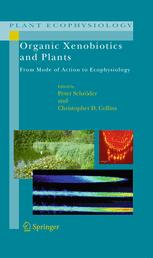

Most ebook files are in PDF format, so you can easily read them using various software such as Foxit Reader or directly on the Google Chrome browser.
Some ebook files are released by publishers in other formats such as .awz, .mobi, .epub, .fb2, etc. You may need to install specific software to read these formats on mobile/PC, such as Calibre.
Please read the tutorial at this link: https://ebookbell.com/faq
We offer FREE conversion to the popular formats you request; however, this may take some time. Therefore, right after payment, please email us, and we will try to provide the service as quickly as possible.
For some exceptional file formats or broken links (if any), please refrain from opening any disputes. Instead, email us first, and we will try to assist within a maximum of 6 hours.
EbookBell Team

4.3
48 reviewsNatural and agro-ecosystems are frequently exposed to natural or synthetic substances, which, while they have no direct nutritional value or significance in metabolism, may negatively affect plant functioning. These, xenobiotics, may originate from both natural (fires, volcano eruptions, soil or rock erosion, biodegradation) and anthropogenic (air and soil pollution, herbicides) sources. And, while affected plants have only a limited number of possibilities for avoiding accumulation of these compounds, they do exhibit several enzymatic reactions for detoxification including oxidation, reduction, hydrolysis and conjugation reactions. In agro-ecosystems in particular these mechanisms have great significance in relation to herbicide detoxification and tolerance. In this volume an international group of experts present an overview of the nature and distribution of organic xenobiotics, including their uptake, effects on plant functioning and detoxification mechanisms. The particular significance of glutathione S-transferases in bio-indication and bio-monitoring, and in the detoxification of volatile organic air pollutants and herbicides is evaluated, and their potential significance in phytoremediation and bioaccumulation will be discussed. This volume will be of interest to a wide audience, from graduate students to senior researchers in a wide range of disciplines including plant ecology, plant biochemistry, agriculture and environmental management. It will also be of practical interest to environmentalists, policy makers and resource managers.